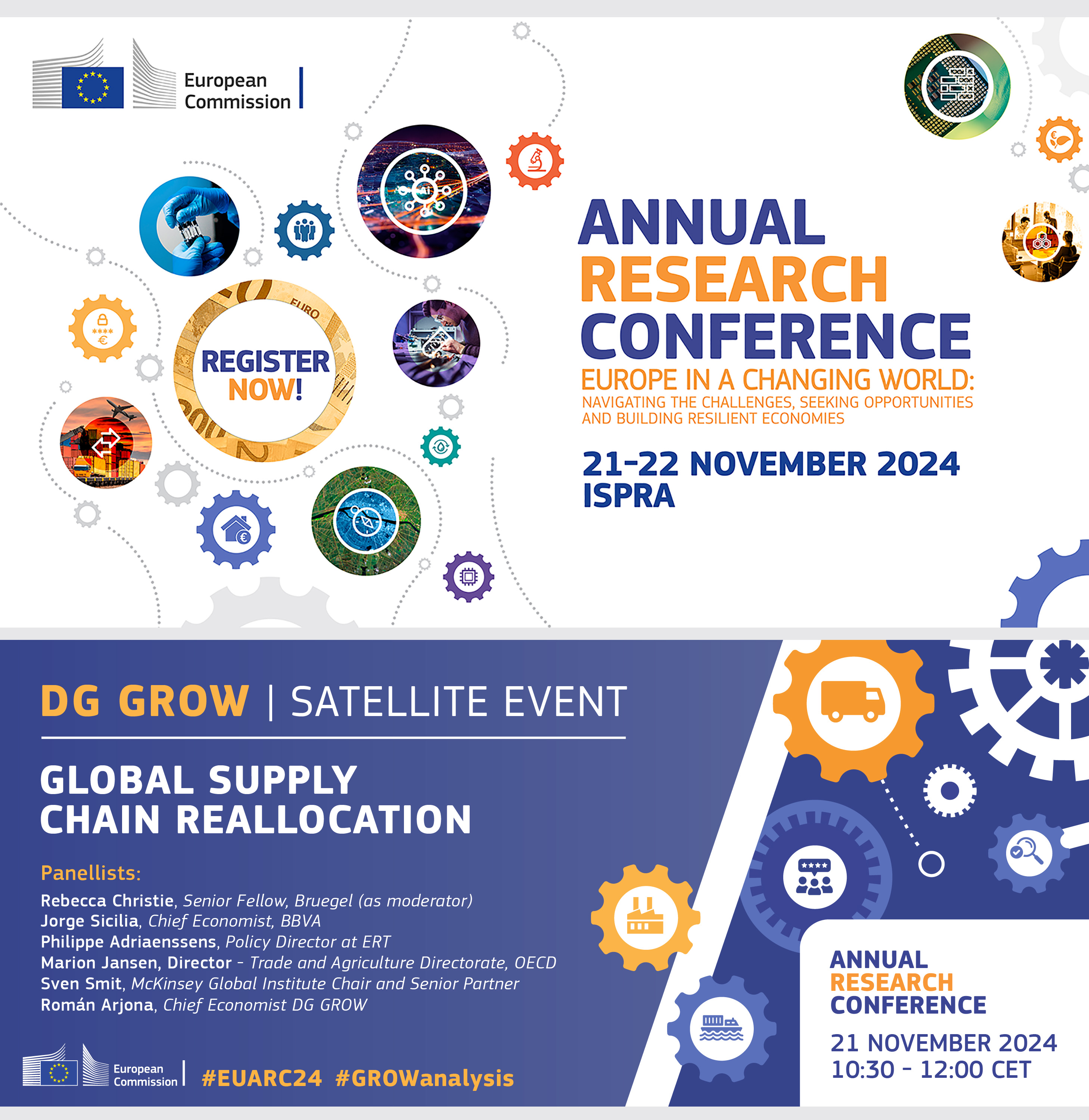The Annual Research Conference (ARC) is the European Commission’s flagship research forum that brings together leading researchers in economics and policymakers. Join us in person or online.
Register to the Annual Research Conference in Ispra
The 2024 edition of the Annual Research Conference (21-22 November 2024) aims to contribute to the understanding of the implications of ongoing trends in
- global trade, including changes in the organisation of global value chains, and their impact on economic efficiency
- capital allocation and incentives for innovation and investment
- low-carbon technologies
- the costs and benefits of industrial policies aimed at the development of strategic sectors including, among others, defence, energy, healthcare and high-tech, and its implications for the EU single market
Topics
The conference aims to facilitate a lively exchange between researchers and policymakers. It will feature the presentation of papers selected by the Scientific Programme Committee.
Discussion on scientific contributions will be held in parallel sessions. Webstreaming will be available through the links in the programme below.
Programme
21 November
13.30 - 14.30 (all times CET) - Opening session
14.45 - 16.45 Parallel Sessions 1-3
1 - Protectionism and industrial policy
2 - Innovation and knowledge diffusion
3 - Monetary union and energy shocks
17.15 - 18.15 - Policy panel
22 November
09.00 - 11.00 Parallel sessions 4-6
4 - Trade and supply chains
5 - Fragmentation and geopolitical risk
6 - Inequality and sustainability
11.30 - 12.30 - Keynote speech
The conference keynote speech will be delivered by Kalina Manova (University College London).
Satellite event: Policy panel on global supply chain reallocation
A satellite event is also being organised by the Directorate-General for Internal Market, Industry, Entrepreneurship and SMEs in Brussels.
More information and registration: Policy Panel on Global Supply Chain Reallocation
Scientific committee
- Gianmarco Ottaviano (Università Bocconi)
- Leonor Coutinho (European Commission, Directorate-General for Economic and Financial Affairs)
- Serena Fatica (European Commission, Joint Research Centre)
- Reka Juhasz (University of British Columbia)
- Julia Le Blanc (European Commission, Joint Research Centre)
- Isabelle Mejean (SciencesPo)
- Moritz Schularick (Kiel Institute for the World Economy)
This year’s edition, co-organised by the Joint Research Centre (JRC) and by the Directorate-General for Economic and Financial Affairs, will take place online and in Ispra on 21-22 November 2024.
- industrial policy | economic policy | supply chain | trade policy | globalisation | EU economic security | euro | Economic and Monetary Union
- Thursday 21 November 2024, 12:00 - Friday 22 November 2024, 14:00 (CET)
- Ispra, Italy
Practical information
- When
- Thursday 21 November 2024, 12:00 - Friday 22 November 2024, 14:00 (CET)
- Where
- Joint Research Centre | Ispra, (IT) | and webstreamedVia Enrico Fermi, 2749, 21027 Ispra VA, Italy
- Languages
- English
Description
Europe is facing significant challenges as it seeks to maintain economic stability and adapt to an evolving geopolitical landscape. De-globalisation trends, which have been observed in goods trade and foreign direct investment, but less so in areas like services or innovation, may have complex implications for global value chains, economic efficiency, capital allocation, R&D incentives, and the structural transformations that are needed to achieve climate neutrality.
The COVID-19 pandemic has laid bare the vulnerabilities of global supply chains and the dangers of over-reliance on foreign industries for critical supplies. It has acted as a catalyst for nations to reassess their industrial strategy, specifically in sectors such as healthcare and technology. In the realm of supply chain resilience, industrial policy has emerged as a key tool. By bolstering domestic capabilities and promoting economic diversification, sourcing from multiple geographies and firms, industrial policy can insulate countries from supply chain disruptions, reducing economic vulnerabilities during crises.
Moreover, the escalating geopolitical tensions and looming trade wars have further prompted nations to re-embrace industrial policy. Governments are deploying these strategies to navigate the uncertainties and to secure a competitive edge in strategic sectors such as defence, energy, and artificial intelligence. The European Union itself is reflecting on the positive externalities of Members States investment in defence and on the role of the EU in promoting this investment, while preserving its single market, setting up its first-ever common defence industrial strategy, to enhance Europe's readiness and security.
The EU’s response to these ongoing trends and its position in the new world order may determine its economic potential, welfare, and the development of its single market. Its currency, which this year is celebrating its 25th anniversary, can play an important role in shaping the geopolitical and geoeconomic position of the European Union.
The 25th anniversary of the Euro's introduction prompts a reflection on the ongoing economic research questions surrounding this currency. Adopted by 20 out of the 27 EU member states, the Euro has sparked extensive discussion about its influence on the stability and growth of the Eurozone's economy and its potential international role. A stronger international role for the euro has much to offer, not only to the euro area and the EU but to the whole international monetary system. Ongoing policy initiatives, including the European Banking Union, the European Capital Markets Union, the digital euro and the enlargement of the euro area and the EU can contribute to unlock the full potential of the euro as a dominant currency, which would also bring a stronger influence for the EU at the global stage.
Related links

Contacts
General contact
- ECFIN-JRC-ARC
 ec [dot] europa [dot] eu
ec [dot] europa [dot] eu
